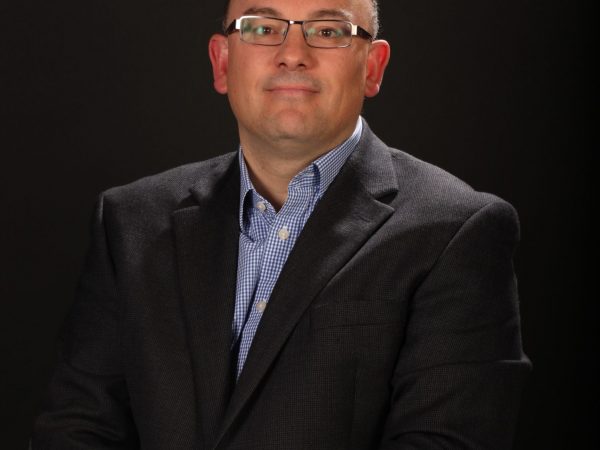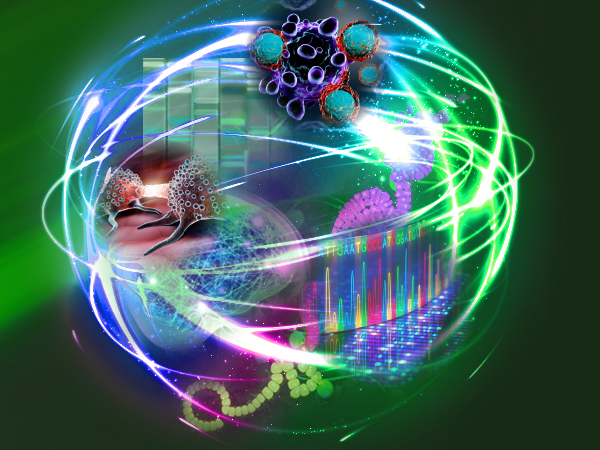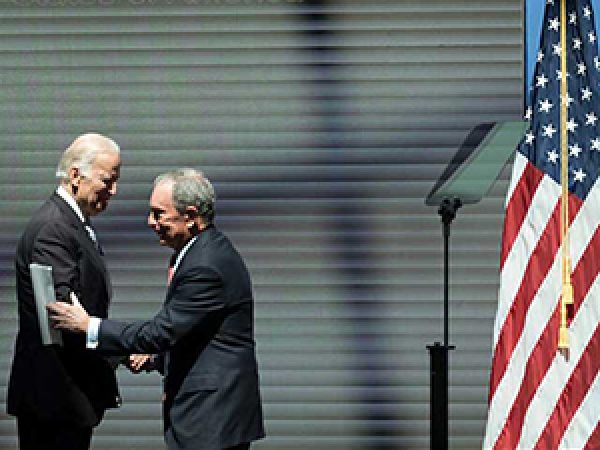Annual Meeting 2022: Integrating Complex Data and Diversity to Decode Cancer Disparities
Researchers have made great progress in understanding cancer biology and advancing the science of prevention, treatment, and survivorship. However, this progress has not been equitable across populations, individuals, and cancer types. The American Association for Cancer Research (AACR) has made significant contributions to address these disparities, including the release of the historic AACR Cancer Disparities Progress Report in 2020.
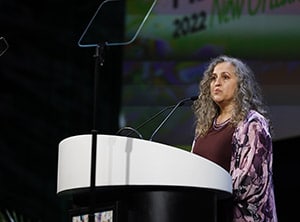
The discussion on cancer health disparities and health equity was also front and center across the Annual Meeting 2022 scientific program and was given the spotlight in one of the plenary sessions, chaired by Mariana C. Stern, PhD, associate director for Population Sciences at USC Norris Comprehensive Cancer Center.
During the session, titled “Decoding Cancer Health Disparities: Integration of Complex Data and Diversity to Achieve Equity,” presenters discussed a variety of topics, including the role of data and tumor banking in precision medicine, the impact of diverse ancestral backgrounds, expanding the study of rare cancers, and patient engagement using culturally sensitive approaches.
Leveraging the power of biobanks and complex data
Yu Shyr, PhD, chair of the Department of Biostatistics and director of the Vanderbilt Center for Quantitative Sciences at Vanderbilt University Medical Center, who was elected during the Annual Meeting 2022 as a Fellow of the AACR Academy, reviewed the importance of big data and how they have revolutionized cancer research.
“We need very large data sets to achieve the goal of decoding cancer health disparities,” Shyr said, noting how the volume of big data is in constant evolution, especially with the advent of spatial “omics” based on single cell technologies.
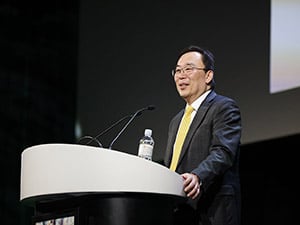
Around the world, a number of biobanks have evolved from sample repository centers to active research partners in precision medicine.
One example is the U.S.-based “All of Us” biobank, a national research resource that includes a diverse cohort of more than 1 million participants. It collects biosamples and integrates them with data from electronic health records to build a comprehensive set of biological, environmental, and behavioral data that can be used to inform research questions on a variety of health conditions, including cancer.
As of March 2022, this platform, which is open to researchers around the world, includes nearly 100,000 whole genome sequences. Importantly, more than 50 percent of the data are from participants from racial and ethnic minority populations, almost 60 percent of the participants are female, and all age groups are represented. According to Shyr, once longer follow-up is available, this resource will be a goldmine to understand health disparities.
Olusegun I. Alatise, MSc, professor and surgical oncologist at Obafemi Awolowo University in Nigeria and co-founder of the African Research Group for Oncology (ARGO), discussed the importance of establishing and supporting biobanks in low- and medium-income countries.
In Africa, he said, very few biobanks are available due to economic, regulatory, sociocultural, and technological limitations, but his team’s experience showed that it is possible to overcome some of the challenges.
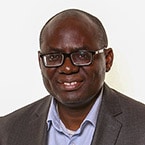
For example, a survey conducted by Alatise and his collaborators in Nigeria on more than 800 people showed that most of the participants had a good knowledge of biobanking, and more than half were willing to donate specimens for research.
ARGO started a disease-specific biobank in 2013, which has been used to conduct molecular and genetic epidemiology studies, including molecular subtyping of triple-negative breast cancer, and assessing the relationship between African ancestry and immunogenicity.
Alatise discussed some of the success strategies for establishing biobanks in Africa, such as encouraging investigators to dedicate part of their grant funding in support of biobanks, integrating the biobanks into existing structures in public institutions to gradually grow the infrastructure, and relying on easy-to-use technology and equipment. Constant community engagement is also crucial to help build trust in biobanks among the research community and the public.
Success in establishing and growing biobanks in Africa requires the concerted commitment of African researchers, the international community, and local donors, said Alatise.
The link between somatic mutations, germline risk, and ancestry in lung adenocarcinoma
Matthew L. Meyerson, MD, PhD, director of cancer genomics at the Broad Institute and director of the Center for Cancer Genome Discovery at Dana-Farber Cancer Institute, discussed a newly discovered link between EGFR mutation and ancestry in lung cancer.
Lung cancer is the leading cause of cancer death across the largest population groups in the U.S. and worldwide, with varying mortality rates in different populations.
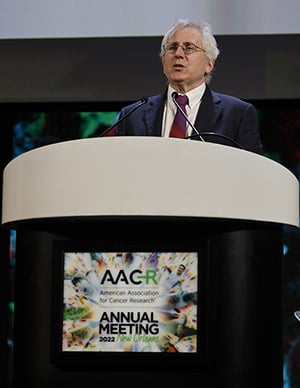
A plethora of targeted therapies developed in the past two decades, combined with a reduction in incidence, has led to a sharp decrease in population-level mortality from non-small cell lung cancer (NSCLC). “This shows that it is critically important to understand lung cancer mutations in patients of all ancestries, to best select targeted therapies,” said Meyerson.
EGFR somatic mutations are the most common targetable genetic alterations in lung cancer. It is well known that the frequency of EGFR-mutant lung cancer varies across different populations, being higher in populations from East Asia (approximately 50 percent) and lower in populations from Europe and North America (approximately 10 percent). In Latin American countries, there is a wide range of somatic EGFR mutation incidence, spanning from 14.4 percent in Argentina to 51.1 percent in Peru. Accordingly, patients of Hispanic origin in the U.S. show a higher frequency of EGFR mutations than non-Hispanic patients.
The origins of these differences are mostly unknown. Meyerson and his team conducted a study to find out whether they are associated with ancestry-specific genomic variations that affect the risk of acquiring somatic mutations in the EGFR gene, or with population-specific environmental exposures.
To answer this question, they studied the ancestry-associated risk of certain somatic mutations in two cohorts of lung cancer patients from Mexico and Colombia and found that Native American ancestry was associated with increased frequency of EGFR mutation and reduced frequency of KRAS mutation.
Furthermore, the researchers assessed the risk associated with global ancestry, which correlates with both germline and environmental risk, and local ancestry, which more strongly correlates with germline risk. According to this study, which was published in the AACR journal Cancer Discovery, both EGFR and KRAS somatic mutations were associated with local ancestry, suggesting a germline risk factor.
“Identifying a germline risk locus might help elucidate the pathogenesis of lung adenocarcinoma, provide hints for approaches to prevention, help refine the populations of non-smokers who might benefit from screening, and inform combination therapies for tumors that carry alterations in the receptor tyrosine kinase/Ras/Raf pathway,” Meyerson concluded.
Profiling rare cancers and enhancing patient engagement
Andy Futreal, PhD, chair of the Department of Genomic Medicine at The University of Texas MD Anderson Cancer Center, talked about cancer health disparities through the lens of rare cancer patient populations and presented his team’s effort to propel rare cancer research forward and build a critical mass of data.
He and his team of collaborators built a Rare Tumor Initiative and set up a pipeline to subject patients to uniform molecular profiling. The initial scope of this project was to profile 1,500 rare tumor patients over a two-year period. The researchers were able to profile more than 3,400 samples, including longitudinal samples in 30 percent of the cases. They are now analyzing these samples to identify the most prevalent somatically mutated cancer genes and characterize the immune reactivity of these tumors.
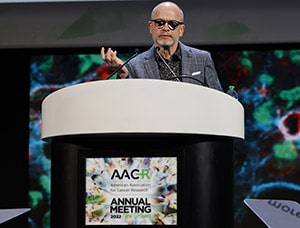
To expand the initial effort on a larger scale, Futreal and team initiated a project called Patient Mosaic, which aims to examine 10,000 patients to perform germline sequencing, delve into the tumor microbiome, and add patient-reported outcomes and lifestyle information.
Through strategic alliances with major pharmaceutical companies, a series of clinical trials of rare cancer entities are being run at MD Anderson. Illustrating the impact of this approach, Futreal presented a study to test an anti-angiogenesis and immune checkpoint inhibitor combination conducted in 20 patients with malignant peritoneal mesothelioma, an exceptionally rare cancer. The combination proved safe and effective, and the study led to inclusion of this treatment in the National Comprehensive Cancer Network guidelines as second-line therapy for malignant peritoneal mesothelioma.
“Within the course of two years, if you have everything organized, you can change the standard of care for a rare cancer,” said Futreal. “This is a model we hope to replicate.”
Another roadblock in the rare cancer field is the lack of appropriate models in which to test new hypotheses. To tackle this problem, researchers at MD Anderson and the Broad Institute started a collaboration to create a model pipeline to generate new cell lines from fresh surgery specimens and make these models publicly available. Of the 171 patient tissues that have entered the pipeline so far, there are seven fully established, genomically verified rare cancer models. “Hopefully, this will empower the field and attract more investigators into this space, which used to be a bit of a desert because there was nothing to work with,” said Futreal.
To reach the rare cancer patient population across the U.S. and generate even more models with greater diversity, MD Anderson established a partnership with the Rare Cancer Research Foundation, which works to facilitate and enhance patient donation. In addition, this partnership aims to provide more support to rare cancer patients in finding the best path to their care. “This is a model of leveraging strengths to build something that is greater than the sum of the parts,” Futreal concluded.
Engaging the sovereign tribal nations in the American southwest for cancer genomics research
Presenter Cheryl L. Willman, MD, director of the Mayo Clinic Comprehensive Cancer Center, recognized the importance of partnering with vulnerable communities that have been left out of cancer research.
She discussed how American Indian and Alaska Native (AI/AN) cancer patients have been dramatically understudied, and the spectrum of genomic alterations associated with their tumors remains virtually unexplored, with only 0.25 percent of patients sequenced in The Cancer Genome Atlas identified as AI/AN.
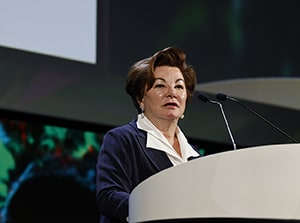
AI/AN communities have highly diverse ancestries, genetics, cultures, and beliefs, but share the burden of profound cancer health disparities, said Willman. They suffer from significantly higher incidence of certain cancers, especially breast, colorectal, liver, and kidney cancers, and have the poorest cancer outcomes of any racial and ethnic group in the U.S.
These disparities are the result of a combination of environmental, cultural, socioeconomic, behavioral, and biologic factors, including lower rates of cancer screening, delayed navigation of patients to care, and severe environmental exposure (it is estimated that 60 percent of the water and soil in the Western watersheds are significantly contaminated by heavy metals that leach from abandoned hard rock mines).
Through culturally appropriate community engagement efforts based on respect of tribal sovereignty, culture, and beliefs, Willman’s team works with the Southwest tribal nations and communities to close the knowledge gap on the AI/AN cancer patients.
She is one of the principal investigators on a research center that is part of the NCI-supported program Participant Engagement-Cancer Genome Sequencing (PE-CGS), funded through the Cancer Moonshot initiative. The goal of this center is to use clinical-grade genomic sequencing to identify new mutational signatures that can lead to improved screening, prevention, and therapeutic interventions.
The project will engage and consent 800 to 1,000 AI cancer patients and survivors to collect extensive participant data in addition to biospecimens. The researchers will return a clinical report to participants and their physicians within 14 days of testing to allow these data to be used for treatment.
One of the main challenges for this work is the lack of an appropriate reference genome, which makes it difficult to understand the significance of the variants. “A major aspect of our project is the creation of an AI refence genome, which will be a critical contribution,” Willman said.

